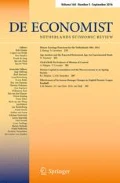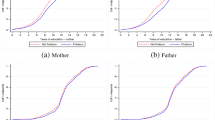Summary
Jencks's well-known sociological path analysis connecting parental socio-economic characteristics and some ability measure of the person investigated with his or her schooling, occupation and income is available for the United States, Sweden and the Netherlands in various versions. For the United Kingdom the analysis has now been applied to the new General Household Survey, supplying over 5000 observations. This article compares the various results and offers a few alternative models, using the American and British data. These alternatives do not offer, in the British case, improvements in variance explained. Moreover, most regression coefficients show wide variations between countries. A suggestion for improvement is derived from a recent study using at least three occupation characteristics.
Similar content being viewed by others
References
Berkouwer, H., J. den Hartog and J. Tinbergen,Alternative Interpretations of Earnings Equations, mimeo, 1978.
Blau, P. M. and O. D. Duncan,American Occupational Structure, New York, 1967.
Bowles, S. and Valerie I. Nelson, ‘The Inheritance of IQ and the Inter-generational Reproduction of Economic Inequality,’Review of Economics and Statistics, LVI (1974), pp. 39–51.
Bulcock, J. W., H. Fägerlind and J. Emanuelsson,Education and the Socioeconomic Career II, Institute for the Study of International Problems in Education, Stockholms Universitet, No 10, 1974.
Dronkers, J. and N. de Jong, ‘Jencks en Fägerlind op zijn Hollands — Een aanzet voor de studie van relaties tussen milieu, intelligentie, onderwijs, beroep en inkomen,’ (‘Jencks and Fägerlind the Dutch Way — a Start to Study the Relations Between Environment, Intelligence, Education, Occupation and Income’),Sociologische Gids, XXX (1978/9), pp. 4–30.
Jencks, C.,et al., Inequality: A Reassessment of the Effect of Family and Schooling in America, New York-London, 1972.
Mincer, J., ‘The Distribution of Labor Incomes: A Survey with Special Reference to the Human Capital Approach,’ Journal of Economic literature, VIII (1970), pp. 1–26.
Psacharopoulos, G., ‘Family Background, Education and Achievement,’British Journal of Sociology, September 1977.
Tinbergen, J.; ‘The Role of Occupational Status in Income Formation,’ in: Cramer, J. S., A. Heertje and P. E. Venekamp, eds.,Relevance and Precision, Essays in Honour of Pieter de Wolff, Alphen a.d. Rijn/Amsterdam, 1976.
Author information
Authors and Affiliations
Additional information
We are grateful to the British Office of Population Census and Surveys for making available to us the data from which the UK results reported in this article were obtained.
Rights and permissions
About this article
Cite this article
Psacharopoulos, G., Tinbergen, J. On the explanation of schooling, occupation and earnings: Some alternative path analyses. De Economist 126, 505–520 (1978). https://doi.org/10.1007/BF01849812
Issue Date:
DOI: https://doi.org/10.1007/BF01849812




